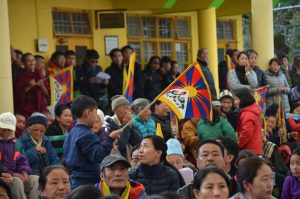
Photo: Contact/Lha
Today thousands of Tibetans-in-exile, along with friends from nations around the world, gathered at the Tsuglagkhang Temple to commemorate the 58th anniversary of the Tibetan National Uprising Day.
The event was followed by a peaceful protest march down to lower Dharamshala, during which Tibetans raised their voices in unison as a message to China and the world, slogans that have persisted since the 1959 uprising against oppressive Chinese rule: “We want freedom, We want justice”, “Long live the Dalai Lama” and “Tibet belongs to Tibetans.”
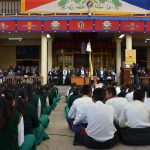
Photo: Contact/Lha
At the ceremony in the temple, members of the Kashag, the Tibetan Parliament-in-exile, Tibetan Justice Commissioners, and Central Tibetan Administration (CTA), along with dignitaries from Italy, France and Canada spoke to address the situation that Tibetans continue to face in the light of history, politically, socially, culturally.
Sikyong Dr Lobsang Sangay, the leader of the Tibetan Parliament-in-Exile, in his March Tenth delivery this year stated that the violation of human rights that happens today in Tibet is ranked second worse by Freedom House, second only to the current crisis in Syria in terms of political and civil rights. Yet the media coverage of Syria far surpasses that of the Tibetan struggle, he observes, reporting that an estimated million Tibetans have perished and 98% of monasteries in Tibet have been destroyed under forceful Chinese occupation. So let us commemorate this day for all those who have sacrificed their lives for the cause of Tibet, he says, as well as to have our voices heard.
Among the foreign dignitaries to speak at the event, Dr Arno Kompatscher, President of South Tyroll, an autonomous region in northern Italy, spoke of the Dalai Lama’s Middle Way approach which is now the official policy of the CTA. He used the example of South Tyroll to demonstrate hope that a peaceful diplomatic solution is possible as well for Tibet. The support from various leaders around the world at the event and for the Tibetan cause demonstrates that the Tibetan people are not alone in their struggle, that the international community also holds strong for the values of basic human rights, freedom, justice, and peaceful co-existence that the movement led by His Holiness the Dalai Lama embodies.
Around the world, Tibetans-in-exile commemorated this day with peaceful protests in major cities including Paris, London, and New York. In Paris, activists were granted permission to rally along Avenue George V, however were denied permission to rally outside the Chinese Embassy due to security concerns.
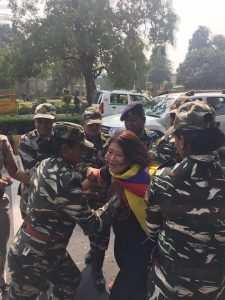
Photo: TYC/Facebook
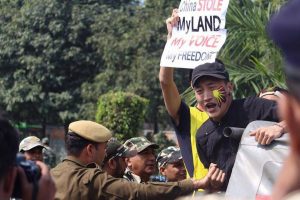
Photo: TYC/Facebook
In New Delhi, Tibetan Youth Congress activists gathered near the Chinese Embassy in protest. More than 150 youth activists, including Vice President Tamdin Sichoe of the Tibetan Youth Congress, were detained by Delhi police and later released.
In California, the Berkeley City Council raised the Tibetan national flag on its city flagpole. This is the 21st time that the city has raised the Tibetan flag to commemorate this day and show its continued support for the Tibetan people and their cause.
In Geneva, the Swiss Parliamentary group for Tibet expressed their support by commemorating this day in front of the Bundeshaus (Swiss Parliament House) with a large Tibetan flag and photo session.
However, in Nepal permission to hold a public gathering to mark the day has once again been denied. The application by the Tibetan welfare office based in Kathmandu was turned down by the district authorities. The Tibetan Refugee Welfare Office in Kathmandu issued a circular dated March 7 stating, “Nepal has denied permission from holding any kind of public gathering this year on March 10, the 58th Tibetan National Uprising Day”. The circular urged Tibetans not to hold public gatherings and peaceful protests as well as encouraging them to abide by the laws of the land and resort to prayers and ritual activities at home.
And in Tibet, the authorities blocked internet connections ahead of the day, reports Radio Free Asia, in a measure to prevent people organising events to mark Uprising Day, or to communicate with the outside world about events taking place there.
The energy of the Tibetan people both within and outside Tibet is an indication that the spirit of Tibet is still very much alive and that, even generations into exile, the Tibetan people have not ceased to stand up for their rights and freedom. The support of nations around the world and the Tibetan diaspora remind us that, in light of the 1959 uprising, many still care deeply about the defiant struggle for freedom, human rights, and peace, and stand in unwavering solidarity the world over to support this cause that belongs not only to the Tibetan people, but to all of us.
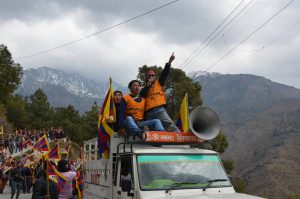
Photo: Contact/Lha
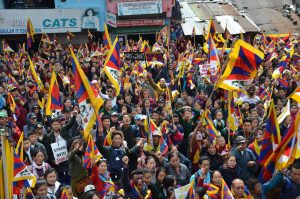
Photo: Contact/Lha
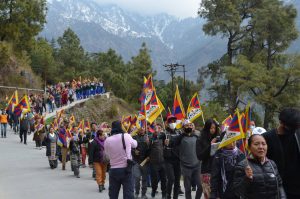
Photo: Contact/Lha




 Print
Print Email
Email